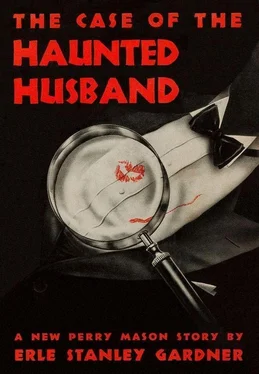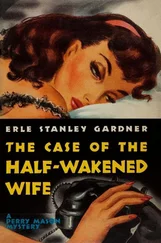She said, “Yes?” into the telephone, then frowned.
“Oh, I am sorry. Who is it, please? What is it? What is the name, please?... But I don’t understand. You want me at the Gateview Hotel?... Lieutenant Tragg of Homicide? You mean — You mean — No! Not Adler! There is some mistake... He is in San Francisco. I was talking with his office only a few minutes ago... I... Y-y-yes, I will be right up.”
She dropped the receiver into the cradle of the telephone. Slowly, she turned to stare at Mason. She regarded him as though he had been some distorted apparition of a nightmare. Her face and eyes were filled with surprise and horror.
“You — you must have known — this.”
Mason arose. “I am sorry, Mrs. Greeley.”
She might not have heard him. She got to her feet mechanically, as a reflex action brought about by the departure of a guest, followed Mason to the head of the stairs.
She didn’t start to cry until Mason was halfway down the treads.
Then the lawyer heard one choking sob, and the sound of feet running across the living room toward the bedroom.
Mason let himself out into the bright sunshine of a cold spring day.
The courtroom hummed with activity. Judge Cortright on the bench, disposed of half a dozen preliminary motions, listened with enforced attention to the arguments of an attorney who seemed unable to come directly to the point, finally interrupted with a ruling, and called the next case. Lawyers came and went. The atmosphere seemed permeated with haste. These were minor matters, things which were occurring over and over, times without number, until they had lost any individuality; infractions of the law which piled up faster than they could be disposed of unless the judicial machine functioned smoothly. The only persons who thought the cases had any importance were the ones directly affected.
The white-faced wife who sat with folded hands while the attorney for her husband argued that the complaint for non-support was technically incorrect, was conscious of the fact that at last she had summoned nerve enough to make the man who sat glowering at her quit spending money on other women and help support his child. He had always sworn that he would kill her if she ever went to law. Would he do it? Her heart was thumping the blood through her tired arteries in pounding sequences. She felt them hammering in her ears. He had said he would kill her. He looked as though he wanted to. Perhaps he would. Then what about the baby? The lawyer droned on. The complaint was defective in that it failed to state the defendant had willfully withheld support.
Judge Cortright listened to the argument wearily. After all, what difference did it make? Knock out this complaint, and the man would be re-arrested. He was conscious only of the passing minutes, of his crowded calendar, of the tedious verbosity of counsel.
At length, he disposed of the preliminary matters. “People versus Stephane Claire,” he called.
Harold Hanley from the district attorney’s office regarded the case as a legal chore. “Your Honor, the defendant is in court represented by Perry Mason. Counsel have agreed that the preliminary may be held at this time. The defendant is on bail. By stipulation of counsel, the hearing may be had with no other notice or formalities.”
“Very well,” Judge Cortright said. “Your witnesses are present?”
“Yes, Your Honor.”
There followed a routine of technical procedure. Attorneys whose matters had been disposed of left the courtroom, some of them still arguing heatedly, others joking, others bustling to some other department where they had matters pending. Harold Hanley called his witnesses to the stand in a quick succession. Frank Corvis, the traffic officer who had been advised of the accident, had come on the wrecked automobile in which the defendant was sitting, had lifted her out. He testified to her position. She was at the steering wheel of the car in the driver’s seat. Both car doors were closed when he arrived. He had found a bottle in the glove compartment. No, he didn’t have that bottle with him. He had sealed it and handed it to the head of the traffic department. Yes, he would know that bottle if he saw it again. Yes, that was the bottle. That was exactly the condition in which he had found it, about one third filled with whiskey. Yes, he had noticed an odor on the defendant’s breath. It was the odor of liquor.
“Cross-examine,” Hanley said to Perry Mason.
The traffic officer turned toward Mason, squaring himself as though belligerently ready to repel any attack.
“Did you,” Mason asked, “notice whether the hands of the defendant rested on the steering wheel?”
“I didn’t notice both hands. I grabbed her right wrist to lift her up.”
“Where was her right wrist?”
“On the steering wheel.”
“You are certain?”
“Absolutely.”
“Then, of course, her fingers were not wrapped around the steering wheel.”
“What do you mean?”
“If her wrist was on the steering wheel,” Mason explained, “it would be an impossibility for her to have her fingers wrapped around the steering wheel.”
Corvis frowned. He glanced at the deputy prosecutor, then away. “I think I got that wrong.”
“Her wrist was not on the steering wheel?”
“Her hand was on the steering wheel.”
“Now, by her hand being on the steering wheel, do you mean that her fingers were wrapped around the steering wheel?”
“Yes. I think they were.”
“You gripped her right wrist when you lifted her through the car window?”
“Yes.”
“You wrapped your fingers around her wrist?”
“Yes.”
“Now did you notice anything peculiar about her right hand?”
“Not at the time.”
“But you did later?”
“Yes.”
“When was this?”
“After she had been removed from the car and was lying on the ground waiting for an ambulance. A motorist had given us an automobile robe which we had spread on the ground, and the motorist and I moved the girl over to this robe.”
“Now by the girl, you mean the defendant?”
“Yes.”
“And at that time, you noticed something about her right hand?”
“Yes.”
“What was it?”
“There was something red on her little finger. At first, I thought it was blood. It came off and made a red smear on the back of my hand. I tried to wipe it off, and it didn’t wipe off the way blood would.”
“It was lipstick.”
“I think so, yes.”
“Now did you notice her left hand?”
“Yes.”
“There was a glove on it, was there not?”
“Yes.”
“But none on her right hand?”
“No.”
“Had you searched the automobile?”
“Yes.”
“Did you find any lipstick in the car?”
“No. I found her purse and sent that in with her in the ambulance.”
“Find any baggage?”
“No.”
“Not anywhere in the automobile?”
“No.”
“Now, if the defendant’s right hand had been resting on the steering wheel, particularly gripping it with the force used by a person in trying to avoid an accident, there would have been lipstick on the wheel of that car?”
“Well...”
“Objected to as argumentative,” the district attorney said.
“Sustained.”
“Did you examine the steering wheel of the car to see whether there were any of lipstick on it?”
“Not then.”
“Later?”
“Yes.”
“Did you find any?”
“Just a very faint trace of lipstick in one place... You see, if she had been trying to fix her lips at the time of the accident and driving with one hand...”
“That will do,” the judge interrupted sternly. “The court will draw its own conclusions. Simply testify to the facts.”
Читать дальше












